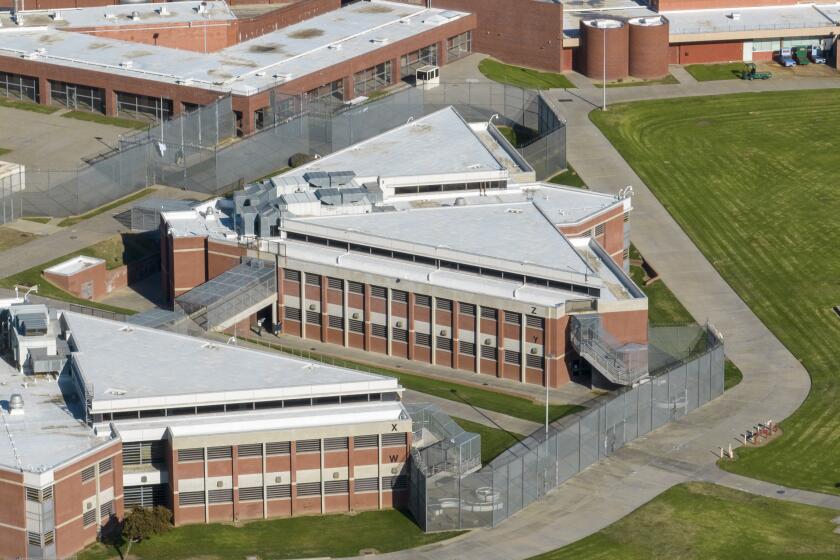Editorial: More money for buildings wonât solve L.A.âs juvenile probation woes

A bill that has sailed through the legislative process and is headed to the state Senate floor is a clever attempt to invent an alternative narrative for the perpetually floundering Los Angeles County Probation Department. Assembly Bill 695 would create a grant program that once funded would provide state money to L.A. County â and only L.A. County â for juvenile justice infrastructure.
The creative story line being used is that crumbling juvenile halls created dangerous conditions for youths and staff. Facilities were supposedly so outdated that state regulators had to step in and declare them unsuitable to house youths. The county Board of Supervisors wouldnât act, so two county labor unions â the probation officers and the probation managers â took the initiative and drafted a bill to make state money available for replacement facilities and desperately needed refurbishment. Should the bill pass, grants will be made, new facilities will be built, and the Probation Departmentâs troubles will be over.
Closing facilities and transferring troubled youths to other buildings will not change the irresponsible management that is endangering and killing people.
This version of events is the unionsâ self-serving fantasy, but it was sufficiently compelling that freshman Assemblymember Blanca Pacheco (D-Downey) sponsored the bill and three of the five L.A. County supervisors â Hilda Solis, Janice Hahn and Kathryn Barger â support it.
The actual story is a lot more troubling. Itâs too long and aggravating to recount in full, but itâs important to know the recent highlights, beginning when probation officers refused to report to work, creating a staffing crisis at the juvenile halls.
In just its first month of operation since reopening, L.A. Countyâs Los Padrinos Juvenile Hall has seen a brawl and a chaotic escape attempt.
Dishonesty was endemic. Probation workers who did come to work faked written certification that they had checked on juveniles in their rooms every 15 minutes as required by law. Their supervisors faked certification that they reviewed videos that were supposed to prove the checks took place. Inadequate staffing meant no daytime activities for juveniles except TV and video games, and nighttime lockdowns that compelled juveniles to relieve themselves in their rooms because they would not be let out to use toilets.
The Los Angeles County Probation Department has a history of sitting on state funds meant to be distributed to youth development programs, undermining its core purpose.
There were several fentanyl overdoses, and one teenager died. There were fights and beatings. The two juvenile halls were finally stripped of their certification to operate, and the county reopened a shuttered third juvenile hall and transferred most of the young wards there. Then a gun was found inside, and there were a riot and an escape, and continuing failure of officers to report to work.
More money for better buildings wonât solve these problems. Itâs true that Central Juvenile Hall, now finally closed for good, is more than a century old, but the problem was never the hardware â the buildings, the equipment, the vehicles. The problem is the software â the people and their willingness to do the jobs for which they are paid. And a Probation Department culture that makes crisis a daily routine.
Los Angeles County juvenile halls have been cited for unconstitutionally poor conditions for decades. Itâs too late to save them.
A decade ago, L.A. County used a state grant to remake Camp Vernon Kilpatrick, formerly a grim barracks in the Malibu hills that was famous for its sports programs. With more than $50 million in state money, L.A. County turned the grounds into Campus Kilpatrick, an impressive modern facility with a âhomelike environmentâ and a design intended to foster intensive therapy and mentoring.
The new approach was dubbed the âL.A. Modelâ of juvenile rehabilitation. But it never materialized because the department staff didnât fully sign on to the program. The grant bought great buildings that were essentially failures.
The common denominator is the boardâs micromanagement. Less meddling may well have been part of an effective prescription had it come forward in recent years.
AB 695 would do the same, providing grants for more revamped probation hardware without improving the software. Itâs as if the Probation Department were an airline whose flight crews donât show up for work, and their union proposes to solve the problem of canceled flights by getting the taxpayers to buy the airline more jets.
Supervisors Lindsey Horvath and Holly Mitchell, to their credit, oppose the bill. In a letter to the Senate Public Safety Committee, they correctly note that the Probation Department caseload has dropped so precipitously that only six of 19 juvenile halls and camps remain open. The county hasnât sufficiently downsized the payroll to account for the diminished task, yet the department still canât get enough people to come to work.
L.A. County does need a juvenile justice bill, but one that would authorize rehabilitation services within its new Department of Youth Development, so that it can lawfully take on work that the Probation Department has shown itself to be inept at handling. The fact that the supervisors have not yet found an author to carry such a bill raises a question as to whether they are serious about their âcare firstâ vision of juvenile justice. If so, they should get themselves a real bill that would do the job and urge the Senate to reject AB 695.
More to Read
A cure for the common opinion
Get thought-provoking perspectives with our weekly newsletter.
You may occasionally receive promotional content from the Los Angeles Times.














